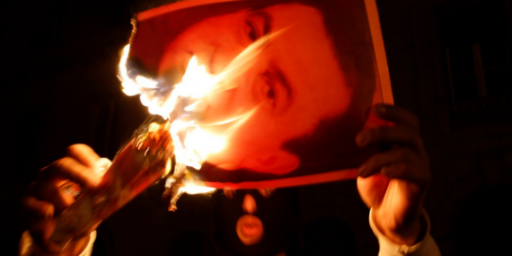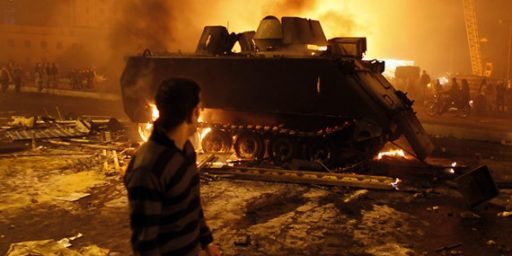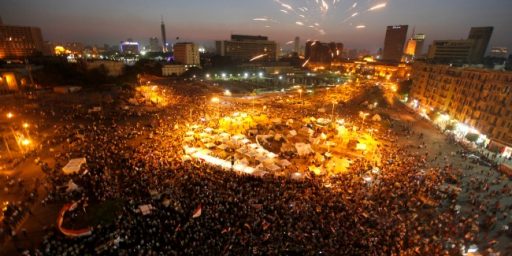The Military in Egyptian Politics
Ellis Goldberg, a Professor of Political Science at the University of Washington and an expert on Egyptian politics, has a pessimistic view about the likelihood that the military is interested in democratization.
 Via Foreign Affairs: Mubarakism Without Mubarak: Why Egypt’s Military Will Not Embrace Democracy.
Via Foreign Affairs: Mubarakism Without Mubarak: Why Egypt’s Military Will Not Embrace Democracy.
First, for those who are unfamiliar with the the historical role played by the military in the regime since the 1952 coup against the King, there are some details in the piece.
As to why the military might be interested in order and stability for reasons other than simply acquiescing to the will of the people:
The officer corps was appeased to some degree, however, by its own economic good fortune. Throughout the 1990s, the army expanded its involvement in the economy. By this decade, industries owned by the military were estimated to control 5 to 20 percent of the entire Egyptian economy; likewise, army officers receive a variety of benefits, such as special preference in access to goods and services.
Today, the army presents itself as a force of order and a neutral arbiter between contending opponents, but it has significant interests of its own to defend, and it is not, in fact, neutral. The basic structure of the Egyptian state as it now exists has benefited the military.
Emphasis mine.
At a minimum, the protests have not been good for the economic bottom line. Estimates have show, in fact, that the economy has lost billions in the last couple of weeks as a result of the protests. This is not good for stakeholders in the economy, such as the military (see the bolded portion above).
Democratic reforms, further, may not be in the military’s economic interests:
A freely elected parliament and a reconstituted government would weaken the role of the presidency, a position the military is likely to try to keep in its portfolio. Moreover, open elections could hand the new business elites power in parliament, where they could work to limit the role of the army in the economy. This would put the army’s vast economic holdings — from the ubiquitous propane cylinders that provide all Egyptian homes with cooking gas to clothing, food, and hotels — in jeopardy.
Goldberg is not optimistic about the military’s intentions:
Indeed, instead of pursuing institutional change, leading military figures will likely try to satisfy the public with symbolic gestures. They would surely investigate the most corrupt businessmen and their ministerial associates for the misuse of public funds and public property. At the same time, there will likely be an investigation of the former minister of interior for deliberately murdering demonstrators during the crisis.
It would certainly be my preference for Egypt to move in a more democratic direction, and perhaps it will. However, it seems as if too many observers and commentators are assuming things about the military’s intentions that may well not be true. Just because the protestors appear to be getting what they demanded doesn’t mean that the military is acting as an agent of the street. Maybe it is, but history dictates a cautious assessment. The military still has the power and they will get to choose what to do with it.

![Military Coup Underway In Egypt [Update: Morsi Deposed]](https://otb.cachefly.net/wp-content/uploads/2011/02/egypt-flag3-512x256.gif)




Doesn’t the Pakistani military have a similar economic setup?
5-20% is not an estimate, it’s a number someone pulled out of the air. If I said that I “estimated” that 5-20% of the US economy was farming you’d know I was blowing smoke — whether or not you knew the correct number.
The odds always favor the pessimists. Until suddenly they don’t. People could have gotten rich betting on the persistence of slavery until, within a relatively short period of historical time, they’d have lost all their winnings. Ditto the catholicism of Christianity, the subordination of women, the influence of astrologers, the spread of communism, and on and on.
The pessimistic prediction is always the safe play, because no one ever calls a pessimist a fool. But the pessimist is also to at least a minor degree complicit.
Cynicism empowers the worst of humanity. In point of fact cynicism helped to keep Mubarak in power. Idealism brought him down. Was it idealism backed by the army’s guns? Yes. Did the army suddenly decide on its own one day to dump Mubarak? No. A bunch of kids with Facebook pages forced the army to act.
Pessimism and cynicism pay homage to the undeniable power of evil. But anyone wishing to compare the relative power in this world of the forces of darkness and light should take note of the fact that we were once a roving band of bug-eating near-apes and we are now 6 billion or so creatures capable of deep submersion, flight, orbital travel, instant worldwide communication and control over an astounding number or former predators and parasites both macro and micro.
Now, what do I think will happen in Egypt? I think there’s a 5-20% chance of things turning out okay. And I think since some young Egyptians have just risked imprisonment, torture and death, we should risk being thought fools.
Here’s an NPR story making a similar point. The military has a hand in most industries, but it’s tourism portfolio resulted from having seized prime coastal property as a defensive buffer against Israel, with peace they decided to sell the land to private developers in exchange for making military officers shareholders:
“No one knows for sure how many resort hotels or other businesses in Egypt are run by the military, which controls somewhere between 5 percent and 40 percent of the nation’s economy, according to various estimates. Whatever the number, Springborg says, officers in the Egyptian military are making “billions and billions and billions” of dollars.”
http://www.npr.org/blogs/money/2011/02/10/133501837/why-egypts-military-cares-about-home-appliances?ft=1&f=1004
I’m guessing the shareholder agreements aren’t transparent.
@Michael:
This isn’t about cynicism, it is about being realistic about likely outcomes.
Undo idealism has a downside as well. I will cite but one word: Iraq.
The issue for me in this case is not to cynical or even pessimistic. I am simply trying to point out that interpretations of event gleaned from TV with some hope mixed in does not necessarily lead to solid analysis.
@MIchael:
Let me put it this way: would you prefer I attempt to analyze these events based on an the understanding of politics that I have developed over the years or should I base it on how I want things to be?
It is unclear to me how pointing out the real power at the moment is in the hands of the military, that they have various stakes in the status quo ante, and that they are likely to wish to maintain as much of their power position as possible is “empower[ing] the worst of humanity” or “pay[ing] homage to the undeniable power of evil.”
Something related that I think is worth pointing out: the conventional method by which chief executives are replaced in Egypt over the period of the last sixty years has been coups similar to the one we’re witnessing. Mubarak is only the point of the spear, not the spear.
The question that remains is whether ordinary Egyptians will be happy with putting a new face on an old regime. IMO it’s too early to tell. Given that 60% of Egyptians weren’t alive when Mubarak came to power the Egyptians as well as those of us in the West may be confusing Mubarak with the regime.
Steve:
I wasn’t dissing your analysis specifically, rather a mindset that has a bias in favor of the negative as the answer least likely to elicit scorn.
And I was making the point that this mind-set empowers the worst actors not the best. People who expect the worst demand nothing, and demanding nothing gets them nothing. There is a strategic value in optimism and the expectations it sets. Optimism and the expectations game just pushed the army to knock off Mubarak when they quite clearly had no such plans of their own.
And the non-cynical sympathies of the American people helped to strengthen what I believe were the not-entirely-cynical instincts of the Obama administration.
But you immediately discount the future potential of the mob. The mob pulled the trigger on this. And one equally valid way to look at this is that the army was obeying the will of its real master: the people. But your assumption is that going forward the mob will be powerless.
When you and thousands of other pundits conclude that the mob is irrelevant and that the likely outcome is military rule you diminish the likelihood that our own government will stay the course. Those who expect nothing demand nothing, and those who demand nothing get nothing.
(Also I just can’t really treat as experts guys who use figures like 5-20% or the one PD cited that has it at 5-40%. I mean, why play games, let’s just say the best “estimate” is 1-99%)
> Undo idealism has a downside as well. I will cite but one word: Iraq.
I think “raging stupidity” “utter incompetence” & “ideology run amok” are better descriptors of the American experience in Iraq in the early 21st century than “idealism”, but that is just me.
The idealism in Iraq consisted in the belief that democracy is better than tyranny. That’s not an idealism that Americans can easily dismiss since it defines us.
We were not wrong to prefer democracy. We weren’t wrong to despise a murderous dictator. I do not personally believe that we were wrong to believe that a democratic form of government can be imposed by an occupying force since we did just that in Germany, Japan, Austria and Italy and all remain democracies to this day.
What followed from that idealism was, as Anjin points out, sheer incompetence, abetted by ideological narrowness. The problem was not that we believed in democracy, or that we thought we could help to midwife it, but rather that we thought we could do it on the cheap so that we could continue to justify ideologically-necessary tax cuts for the well-off. Mr. Bush and Mr. Cheney and Mr. Rumsfeld were not Truman, Eisenhower, MacArthur or Marshall. (Now, that’s understatement!)
The United States is an exercise in sensible idealism. We believed — in defiance of just about all of human history up to that point — that we could govern ourselves. Starting from that idealistic premise we proceeded with notable intelligence, and a knowing appreciation of human nature, to create the greatest nation on earth. But the smart money was against us.
One other point: there is now a democracy of sorts in Iraq. A shaky one, but a democracy. The reason it took them so long to decide the results of the last election is that parties were horse-trading, not murdering each other in the street. So as much as we screwed that up, we do in fact, right now, have a much better government in Iraq than we had under Saddam.
I don’t think the military as a generalisation, particularly the upper ranks, is particularly interested in democratisation but they are faced with a situation where changes have to be made to satisfy wider expectations. Their ability to withstand these popular demands are in reality not that formidable since they pivot on the willingness of OR’s in what is I think a conscript army to fire on the general population. In the last analysis I don’t think they would do this and I have some knowledge of Egypt. Thus the weapon of repression wold break in their hand and who knows the weapons could be turned on them.